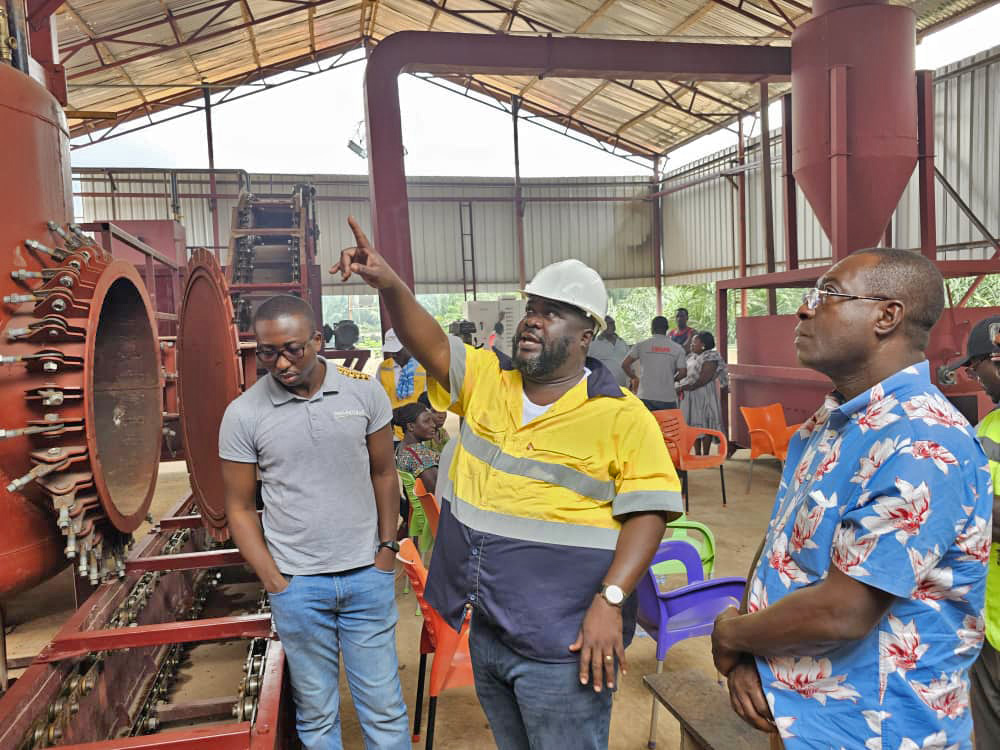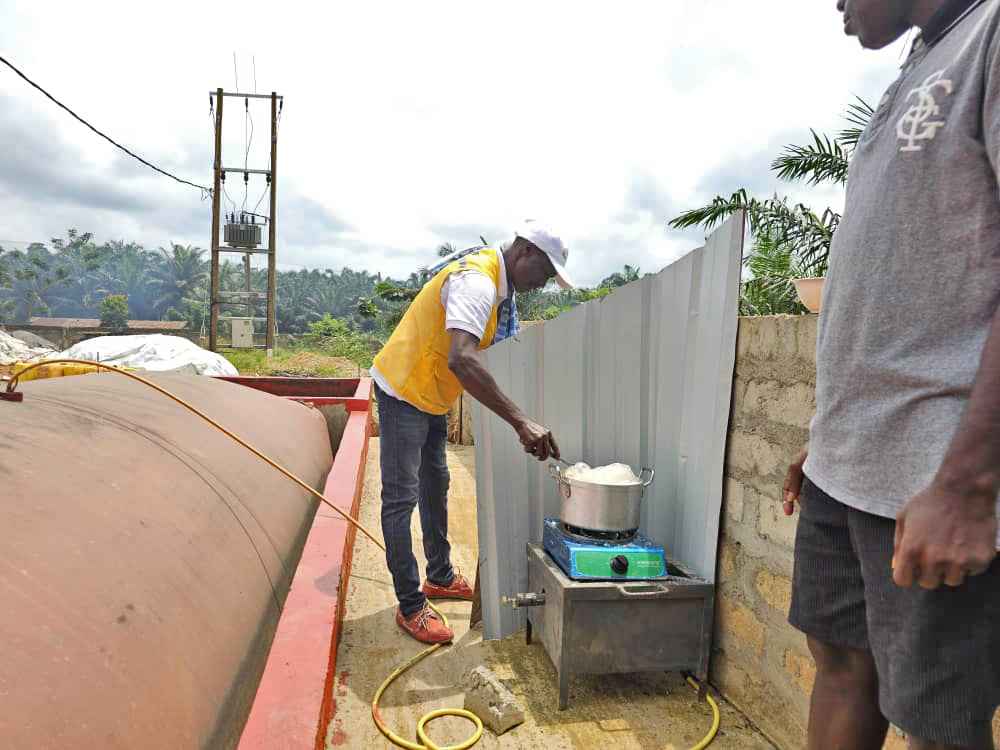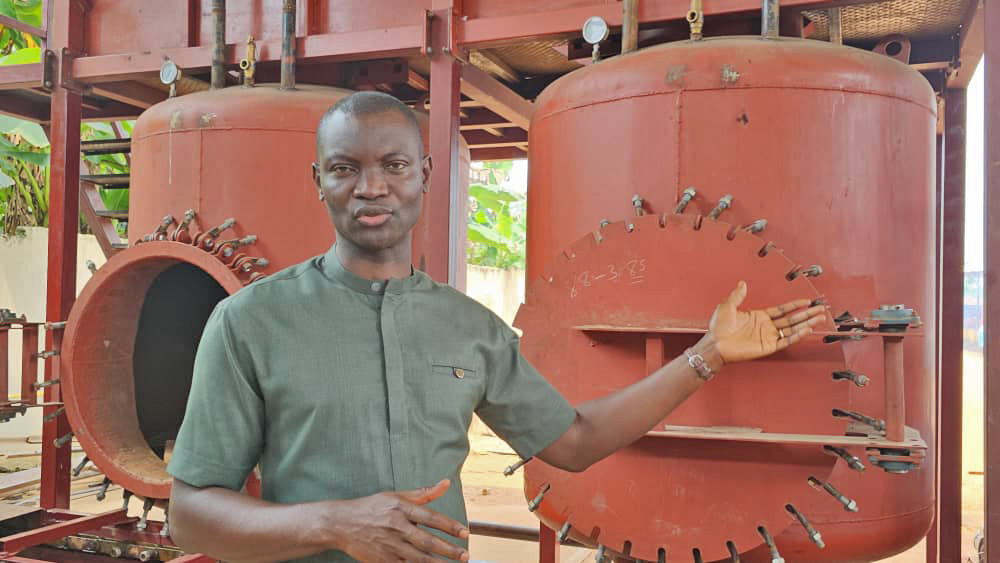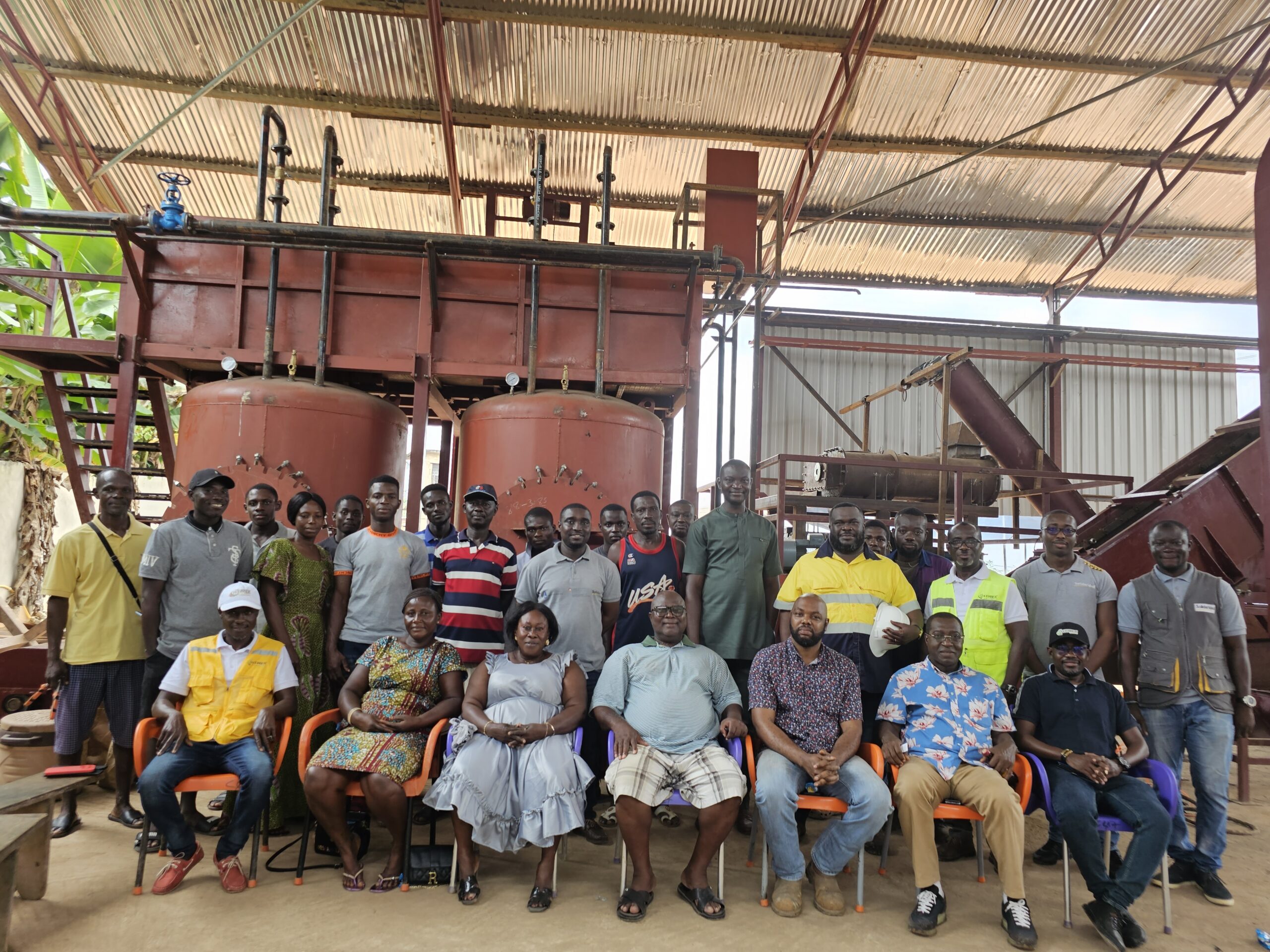A Solidaridad team visits the Joe Farms and Processing Enterprise.
The new Joe Farms mill is a significant upgrade from the older artisanal oil palm milling process, commonly referred to as the “Kramer.” This process suffered from numerous inefficiencies and relied primarily on wood as an energy source, which contributed to deforestation, while releasing an excessive amount of air-borne pollutants that had a direct impact on the health and safety of workers, primarily women, at the processing facility.
The new climate-smart milling upgrade represents a transformative shift. It does not only promote decent working conditions but also safeguards the environment. This is indeed a game changer.
Bossman Owusu, Country Representative, Solidaridad in Ghana
The upgraded mill is part of the multi-layered efforts taking place under the National Initiatives for Sustainable Climate Oil Palm Smallholders (NISCOPS) programme, funded by the Dutch Ministry of Foreign Affairs and supported by Solidaridad. The innovative project works to reduce the negative impact of oil palm milling on the environment and the mill workers, all while reducing the methane and carbon dioxide emissions which contribute to climate change.

The Many Benefits of a New Processing Mill
A team led by Isaac Kwadwo Gyamfi, Regional Director of Solidaridad West Africa, paid a visit to Joe Farms and Processing Enterprise in the eastern region of Ghana. While there, he inspected the progress of the mill upgrade, which has been co-funded by the United Nations Development Programme (UNDP) and Ghana’s Ministry of Environment, Science, Technology and Innovation.
“Based on the strides we witnessed, Joe Farms is making significant headway in transitioning from the traditional climate-harsh milling practices to a climate-smart production system. This aligns with the rising global demand for climate-friendly Crude Palm Oil (CPO), making it crucial for securing market access,” Gyamfi said during the visit.

Features of the New Mill
The improved mill is designed to fully utilize biomass to generate energy for oil palm and food processing. The benefits include:
- The elimination of wood, bamboo and old car tires as a fuel source, protecting the local environment.
- The removal of smoke emissions, which will result in an improved workplace, especially for the many women using these facilities.
- The installation of a low-pressure steam boiler to help sterilize and process fresh fruit.
Yaw Awusi Antwi, owner of Joe Farms, expressed his deepest gratitude to all the partners for elevating his production process. He indicates that the innovative approach will help his enterprise achieve an oil extraction rate of 20 percent that will match the average global oil extraction rate from oil palm.
Advancing Circularity Utilizes Waste and Improves Capacity
To complement Solidaridad’s push for circular production systems and the repurposing of waste products, the Joe Farms mill has also installed a bio-digester to harness the potential of methane gas found in palm oil mill effluent (POME). With its high concentration of methane, which is more harmful than carbon dioxide as a greenhouse gas, the POME has the potential to fuel many of the mill’s activities. The innovative bio-digester is designed to capture methane from the effluent and then re-use it as an energy source in the production process.

The upgraded processing center can reduce emissions by up to 1,400 metric tonnes of carbon dioxide-equivalent gasses per year. As an additional benefit, the new bio-digester also produces liquid fertilizer, which can be used to support local agriculture, creating a closed-loop system.

Improved Conditions for Workers
Solidaridad understands the importance of the health and safety of the women and men working in oil palm processing facilities. The improvements at Joe Farms have had a direct impact on the members of the community who depend on oil palm processing for their livelihood. Ama Mansa, a mill worker, said that the new system has completely eliminated smoke emissions and the heat and energy sources have been effectively insulated. She indicated that these improvements have made the work environment significantly safer, while addressing the health concerns that had previously impacted the workers at the site.

Enhancing Local Mill Fabrication Capacity
The newly renovated mill has taken advantage of a talented pool of engineers and mill fabricators in Ghana. All improvements to the mill were fabricated on-site by a team of Ghanaian professionals, including members of the local community. This has created a unique opportunity to sustain local jobs and promote skill development; instead of after-sales service from an importer, the mill now relies on that local expertise for prompt maintenance services and hands-on assistance.
While the traditional methods of processing oil palm were ineffective and inefficient, the newly rebuilt mill will improve productivity and incomes, while also contributing to the livelihoods of nearby residents who depend on the mill to support their families. The sustainable benefits of the Joe Farms mill project is yet another example of the power of partnerships, and is part of Solidaridad’s ongoing work to meet the needs of smaller communities in West Africa.

